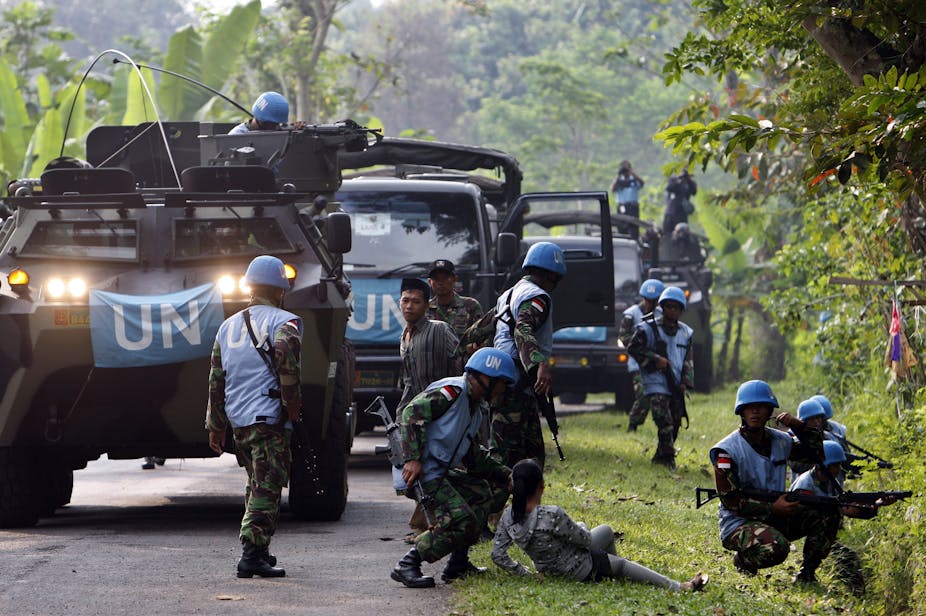In an era where it seems violent conflict is spreading, almost unchecked, in so many parts of the world, we take it for granted that it is the responsibility of a group of traditional world powers, among them the United States and Britain, to lead humanitarian and peace-keeping missions.
They are often joined by other regulars. Many Scandinavian and north European countries, as well as Canada, Japan and Australia have placed conflict prevention, humanitarian assistance and peace-building activities at the heart of their respective foreign policies. Yet far less attention has been given to how some of today’s “rising powers” have deployed hard and soft power resources to pursue their own peace agendas.
In June this year, Vision of Humanity published the latest version of its Global Peace Index, a composite of 22 indicators such as the level of violent crime and accessibility of small arms and light weapons, developed to provide a measure of national peacefulness.
For those of us interested in better understanding what are commonly referred to as “rising power” states, encapsulated in acronyms such as BRICS (Brazil, Russia, India, China, South Africa) and MINT (Mexico, Indonesia, Nigeria, Turkey), the Global Peace Index serves as a timely reminder that many still face their own internal challenges to peace and security, with varying degrees of internal stability.
Nigeria, for example, has progressively dropped down the index over the past seven years from being the 125th most peaceful country (out of 138) in 2008 to 151st (out of 162) this year. This is largely due to the likelihood of violent demonstrations and stubbornly high level violent crime. In Turkey (128 on the list), which has had more than its share of social and political unrest this year, the number of fatalities, injuries and property damage caused by terrorism remains high. Vision of Humanity estimates the national cost of violence in Turkey is more than US$52 billion.
While Brazil had witnessed a slight improvement in its overall standing in the Peace Index between 2008 and 2011 (93 in 2008 to 77 out of 153 in 2011), this year it has fallen back to 91 as a result of the number of homicides. Access to small arms and light weapons in Brazil is considered to be particularly high.
Despite these internal challenges, what has been noticeable in recent years has been how a number of these rising powers have looked beyond their own borders to conflict prevention, humanitarian assistance and peace-building activities. In short, it is clear that that many rising powers are pursuing their own external agendas for peace.

Nigeria, for example, was heavily involved as a peacemaker or enforcer through its involvement with ECOWAS/ECOMOG in West Africa in the 1990s. Brazil has been leading the peacekeeping operations in Haiti since 2004. And since 2011, Turkey has become one of the largest donor countries for humanitarian aid in the world and a lead country for assistance in a number of war-torn countries such as Somalia.
It is these external activities that need to be examined and better understood, a process which will help to determine the extent to which today many rising powers can be said to be emerging as “rising peace powers”.
‘Smart peace’
If we are going to be able to harness the hard and soft power of emerging nations, we need to develop a way to analyse external activities on a country-by-country basis. Potential indicators might include the money spent on humanitarian aid and peace operations, the number of personnel deployed in peacekeeping missions, an assessment of a country’s diplomatic presence, alongside the educational and cultural projects it is involved with.
This would help determine which countries can offer most in which areas and assist the global community in working out what the most effective combination of these indicators is in a specific case in order to deliver “smart peace” – and which nations are best equipped to do so.
A project at the Centre for Trust, Peace and Social Relations (CTPSR) at Coventry University, will research the possibility of developing an efficient model for involving these rising peace powers in conflict prevention, humanitarian assistance and peace-building operations, using South Africa, India, Nigeria and Turkey (SAINT) as models.
These are all rising powers with ambitions to influence international affairs and matters of peace and security beyond their immediate neighbourhoods. They have all been involved in humanitarian assistance and peace operations in Africa in different capacities.
In a conflict-riven world it’s increasingly important to find out ways in which the strengths of the rising powers can be harnessed to work either independently or with the more traditional powers so that these crises can be addressed more quickly and effectively.

